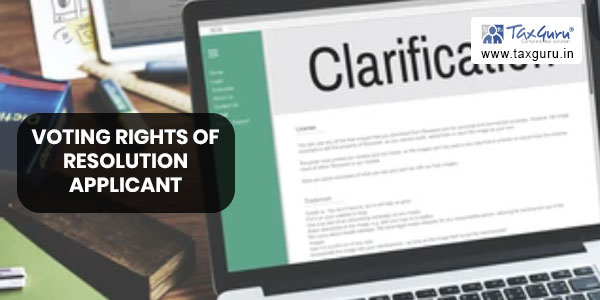Clarification on voting rights of the Resolution Applicant in the meeting of Committee of Creditors (Coc) if such Resolution Applicant is also a financial creditor
We would like to draw attention to the following provision of Insolvency and Bankruptcy Code (IBC) 2016 which may be misused by Resolution Applicants during Corporate Insolvency Resolution Process (CIRP) of Corporate Debtor.
Section 30(5) of IBC 2016:
The resolution applicant may attend the meeting of the committee of creditors in which the resolution plan of the applicant is considered:
Provided that the resolution applicant shall not have a right to vote at the meeting of the committee of creditors unless such resolution applicant is also a financial creditor.
As per above proviso if resolution applicant itself is financial creditor than having right to vote at the meeting of committee of creditors in which resolution plan is considered.
Analysis how resolution applicants may be misused aforesaid provision for its own benefit.
Example: A Ltd. intends to takeover B Limited. B Ltd. having outstanding debt of Rs. 100 crores comprising of Rs. 40 crores in the form of Non-convertible Debentures (NCDs) and Rs. 60 crores in the form of loans from various private and public sector banks (Rs. 30 crores from Private Sector Banks and Rs. 30 crores from Public Sector Banks). B Ltd. admitted under CIRP due to default in repayment of loans. In this situation A Ltd. acquired NCDs of Rs. 40 crores from Debenture holders at a price of Rs. 10 crores. NCDs holders taken haircut of 75% of its outstanding debt before completion of CIRP. After that A Ltd. acquired loans of Rs. 30 crores from private sector banks through Assets Reconstruction Company (ARC) at prices of Rs. 7.5 crores. Private Sector Banks taken haircut of 75% of its outstanding before completion of CIRP.
It means A Ltd. became financial creditor of B Ltd. and holding 70% voting rights in Committee of Creditors (CoC) meetings (40% as Debenture holder and 30% through ARC).

A Ltd. controls all decisions of CoC meetings including approval of the Resolution Plan which requires approval of 66% voting of CoC as per Section 30(4) of IBC.
At the time of approval of Resolution Plan of B Ltd., A Ltd. would consider their own resolution plan even after other Resolution Applicants giving higher value for acquisition of B Ltd. which is against the object of the code i.e. value maximisation.
The following is object of IBC;
“An Act to consolidate and amend the laws relating to reorganisation and insolvency resolution of corporate persons, partnership firms and individuals in a time bound manner for maximisation of value of assets of such persons, to promote entrepreneurship, availability of credit and balance the interests of all the stakeholders including alteration in the order of priority of payment of Government dues and to establish an Insolvency and Bankruptcy Board of India, and for matters connected therewith or incidental thereto.”
In present scenario A Ltd. would violate the aforesaid object of IBC in following manner;
1. Violation of Maximisation of value of assets by approving its own resolution plan even after other Resolution Plans having higher value or by quashing competition for submission of resolution plan.
2. Violation of object to promote entrepreneurship by creating monopoly during the entire process of CIRP of B Ltd. or by not providing fair and equal opportunity to each prospective resolution applicant.
3. Violation of object of balance of interest of all the stakeholders by approval of its own resolution plan which has provision of less payments to operational creditors, employees and workmen etc.
Following affecting the interest of larger public in this scenario;
1. A Ltd. created a monopoly during the entire process of CIRP of B Ltd.
2. As per the provisions of IBC every Resolution Applicant is required to be provided fair and equal opportunity to submit the Resolution Plan. In above scenario other prospective Resolution Applicant would not get the fair and equal opportunity regarding approval of their Resolution Plan
3. Remaining 30% Public Sector Banks which did not transfer their Debt to ARC also not able to achieve value maximisation by negotiation which ultimately affect the interest / money of larger public.
4. A Ltd. quash the competition including object of IBC of value maximisation which ultimately affect the interest of larger public
5. In the entire CIRP of B Ltd. the decision of A Ltd. would prevail over other Public Sector Banks. Approval of all Resolutions / agenda items including important crucial agenda items like approval of evaluation matrix, resolution plan etc. in the CoC meeting depend upon voting of A Ltd.
6. Private Sector Banks may lose the money (ultimately public money) by taking haircut of 75% before completion of CIRP
7. Affect the object of balance of interest of all the stakeholders by approval of its own resolution plan which has provision of less payments to operational creditors, employees and workmen etc.
As per draft code of conduct published by IBBI as per Discussion paper dated 27th August, 2021, a member of committee shall
h) not influence the decision or the work of committee so as to make undue gain or advantage for itself or its related parties
j) ensure that decisions are made without any bias, favour, fear, coercion, undue influence or conflict of interest.
In aforesaid scenario, A Ltd. as CoC member influences the decision of committee to take undue gain or advantage for itself or its related parties. Further A Ltd. is biased and having conflict of interest in taking the decision. Hence, this is against the code of conduct published by IBBI.
Therefore, as per our views A Ltd. shall not be entitled for voting rights in the CoC meetings of B Ltd. to avoid any conflict interest, biasness, undue gain and advantage etc. to achieve the object of IBC including to protect the interest of public at large.




